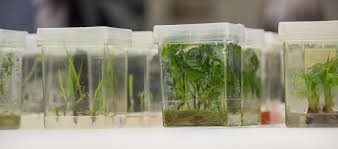Plant Genetics
Homework Help & Tutoring
We offer an array of different online Plant Genetics tutors, all of whom are advanced in their fields and highly qualified to instruct you.
Plant Genetics

Courtesy of Wikimedia
The study of plant genetics involves research into the hereditary traits of plants, with a focus on variations and means of transmission. The field may be divided into functional genomics (how genes work), structural genomics (where genes are located), or it could follow genetic patterns within certain populations to further understand the background of plant evolution.
Scientists who specialize in these areas are known as plant geneticists and most often will concentrate on the process of selective breeding to ensure the best plants are harvested. A subcategory of this specialty would include the focus on gene identification, with the objective of creating plants that are improvements upon the parent species. These scientists are known as molecular plant geneticists. They strive to continually improve the quality of fiber and nutrients contained within the plant. Read this article to learn more about the importance of molecular plant genetics in present day plant breeding programs.
Plant geneticists will often work with commercial companies to enhance agricultural production on plants such as wheat, tomatoes, grapes, and soybeans. Private companies will also contract with plant geneticists to produce new seeds and variances of trees, vegetables, and grains used in everyday life. These scientists play a crucial role in the research, education, and regulation of our food production and consumption, as well as in methods of genetic transfer currently used in food production (as described in this article), which are both regulated by government agencies.
A plant geneticist would first obtain a degree in plant science, horticulture, biochemistry, forestry, agronomy, or biology. Each of these majors requires a heavy focus in mathematics, biochemistry, microbiology, chemistry, and biology. Furthermore, it would be highly recommended to earn a graduate degree in one of these fields to qualify for more complex research positions.
Examples of courses in plant genetics would include:
- Botany
- Integrated principles of biology
- Trigonometry
- General chemistry
- Macroeconomics
- Microeconomics
- Physics
- Ecology
- Plant pest management
- Plant production and management
- Physiology and ecology of crops
- Plant breeding
- Nutrition of horticulture
- Politics and ecology
Students interested in learning more about plant genetics and breeding might consider reading this book by George Acquaah or this article, published in Genome Biology, about the future of plant biology and the next generation of plant genetics.
To fulfill our tutoring mission of online education, our college homework help and online tutoring centers are standing by 24/7, ready to assist college students who need homework help with all aspects of plant genetics. Our biology tutors can help with all your projects, large or small, and we challenge you to find better plant genetics tutoring anywhere.
College Plant Genetics Homework Help
Since we have tutors in all Plant Genetics related topics, we can provide a range of different services. Our online Plant Genetics tutors will:
- Provide specific insight for homework assignments.
- Review broad conceptual ideas and chapters.
- Simplify complex topics into digestible pieces of information.
- Answer any Plant Genetics related questions.
- Tailor instruction to fit your style of learning.
With these capabilities, our college Plant Genetics tutors will give you the tools you need to gain a comprehensive knowledge of Plant Genetics you can use in future courses.
24HourAnswers Online Plant Genetics Tutors
Our tutors are just as dedicated to your success in class as you are, so they are available around the clock to assist you with questions, homework, exam preparation and any Plant Genetics related assignments you need extra help completing.
In addition to gaining access to highly qualified tutors, you'll also strengthen your confidence level in the classroom when you work with us. This newfound confidence will allow you to apply your Plant Genetics knowledge in future courses and keep your education progressing smoothly.
Because our college Plant Genetics tutors are fully remote, seeking their help is easy. Rather than spend valuable time trying to find a local Plant Genetics tutor you can trust, just call on our tutors whenever you need them without any conflicting schedules getting in the way.






